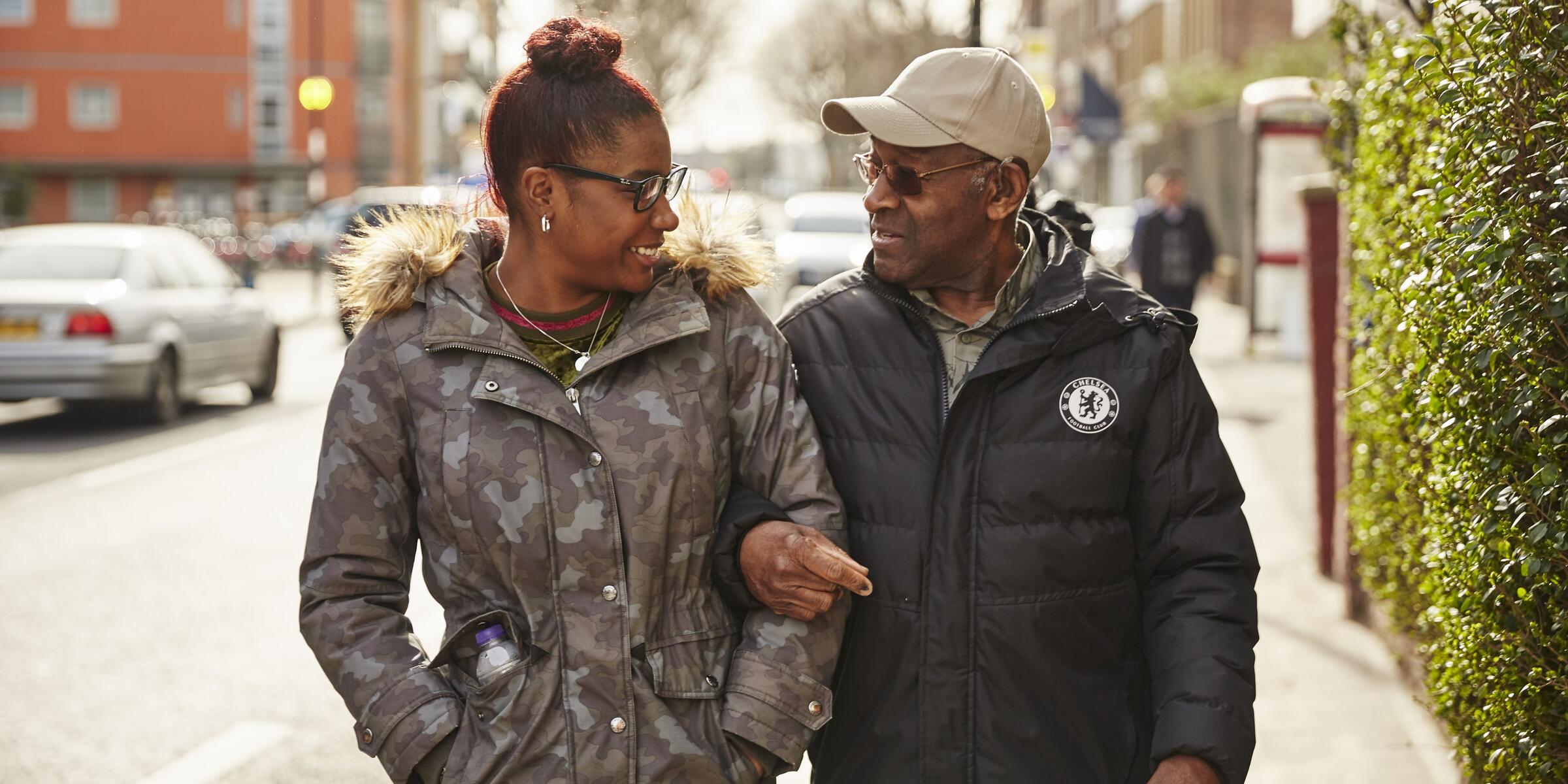
Advice
Moving well with dementia: why physical mobility matters
Movement expert Dr Ríona McArdle and former carer, Lyn Rogers, explain why dementia can make moving around more difficult, and share ideas for supporting you to keep moving well.
Most people don’t think of dementia as a mobility problem but it’s an important part of living with the condition. You need to be able to move around safely. That could mean walking without aids, with a stick or frame, or with support from another person.
Moving helps you to stay independent and socially active for longer, as well as keeping you feeling mentally and physically well.
When mobility gets harder, everyday life can quickly change. You might fall more easily, lose self-confidence, or gradually become less active. This can lead to a further loss of strength, balance and mobility and contribute to worse mental health and loss of independence.
What do physical mobility problems look like in dementia
Dementia can affect your mobility in different ways. You might walk more slowly, or you might feel unsteady and lose your balance.
These changes can increase the risk of falling. Having dementia means that you’re twice as likely to fall as people without dementia. If you fall you and hurt yourself seriously, it can be very hard to get back to the level of mobility you had before.
Even if you don’t have a serious injury, you may feel worried or scared of having another fall. This often leads to people reducing their activity, which then leads to a loss of strength and mobility.
Why does dementia affect movement?
Movement begins in your brain. To walk safely, you need thinking skills, such as planning, decision-making and the ability to judge distances. You also need balance an coordination. Sometimes you might also need to do something else while you’re moving, like walking and talking. All these abilities can be affected by dementia.
Other health problems can make things harder, such as arthritis, tiredness or poor vision.
Different types of dementia can cause different movement problems. For example, if you have dementia with Lewy bodies you might shuffle when you walk and have variable or uneven walking patterns. This can lead to more slips, trips and falls. Some rarer types of Alzheimer’s disease, such as posterior cortical atrophy, cause problems with vision and spatial awareness, which makes it more difficult to find your way.
Even so, mobility is not often seen as a priority in dementia care. People may assume 'it won’t help' or 'there isn’t time'. But keeping active is one of the best ways to support independence and wellbeing. Building strength helps with balance, reduces the risk of falls, and can lift mood and confidence. Small amounts of regular activity, adapted to your own needs, can make a big difference.
How can physical movement make a difference to people living with dementia?
Small amounts of daily movement can help maintain strength, balance and confidence. Here are some practical tips:
Keep moving every day
Sitting more and moving less can lead to loss of strength and balance. Try to bring opportunities for movement into each day, building it into your daily and weekly routine. This could be going for a short walk, dancing to music, swimming, gardening, singing, or doing gentle stretches in a chair or on the floor. Tai Chi and yoga are great for balance too.
Make moving enjoyable
What matters most is finding something that you enjoy and can do regularly. Making it social often helps: a cup of tea, a chat, some singing, and a few simple exercises can make moving feel like fun rather than a chore. When carers join in too, everyone benefits.
Build confidence and motivation
Even small wins make a difference. Celebrate every success, no matter how small. Believing 'I can still do this'” is just as important as the exercise itself.
Encourage independence
If you care for someone with dementia, try to encourage them to keep doing as much for themselves as possible rather than trying to do everything for them.
If you’re a carer, keep moving too
Carers who are able to move well themselves can join in with activities and provide encouragement that really helps.
Everyone’s abilities and health needs are different, so what feels safe for you may not be right for someone else. Carers and family members can play an important role by talking to you about what you enjoy and adapting activities to suit your needs.
If you’re unsure about what type or level of activity is appropriate, it’s always best to get advice from a doctor, physiotherapist or another healthcare professional. Staying active won’t stop dementia or cure it, but it can make a real difference.
Regular movement can help you feel more confident, stay independent for longer and enjoy a better quality of life. And the benefits aren’t just for people with dementia – keeping active is important for all of us as we get older.
Physical activity and exercise for people with dementia
Learn more about movement and how it can help make a difference to people with dementia.

